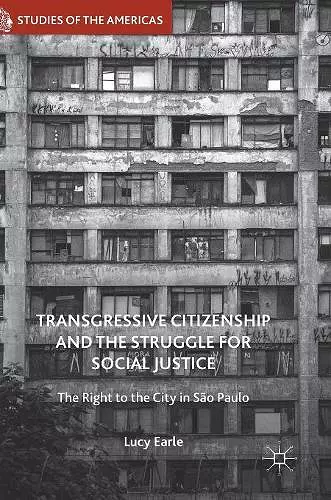Transgressive Citizenship and the Struggle for Social Justice
The Right to the City in São Paulo
Format:Hardback
Publisher:Springer International Publishing AG
Published:10th Apr '17
Currently unavailable, and unfortunately no date known when it will be back

"Based on first-rate ethnographic research with social movements in the city of Sao Paulo, this book breaks new ground in our understanding of urban protest and the relationship between civil rights and political mobilisation. It introduces the innovative concept of 'transgressive citizenship' to conceive of the potentially productive tensions that can exist between state and society, and how these can lead to more inclusive forms of urban co-existence. As such, it will undoubtedly constitute a major reference point to all those interested in the nature of politics and society in Brazil and beyond." (Dennis Rodgers, Professor of International Development Studies, University of Amsterdam, the Netherlands) "An engaging read both as a discussion on citizenship and social justice in the city and as an account of how the social movements of Sao Paulo both used the law and acted outside the law." (David Satterthwaite, Senior Fellow, International Institute for Environment and Development, UK)
Drawing on ethnographic fieldwork with a federation of housing movements, this work demonstrates the ongoing relevance of the concept of the right to the city for social movements of the urban poor, and examines these movements’ creative interpretation of national legislation to support their claims for housing and urban citizenship.This book analyses the struggle for social justice in São Paulo, Brazil. It takes the wave of protests that began in the city in 2013 as a starting point, and grounds them in the history of social movement mobilisation in urban Brazil. Drawing on ethnographic fieldwork with a federation of housing movements, this work demonstrates the ongoing relevance of the concept of the right to the city for social movements of the urban poor, and examines these movements’ creative interpretation of national legislation to support their claims for housing and urban citizenship.
“Earle offers an innovative perspective on how the urban poor see themselves as citizens. This is one of the book’s main strengths. … The book poses the right questions and should therefore be read by anyone interested in the present transformations of citizenship.” (Bianca Tavolari, Urban Studies, Vol. 56 (5), 2019)
“This book is an important addition to comparative urban studies in its explanation of how political mobilization occurred, was justified and materialized. It underlines the importance of politics in understanding the evolving definition of citizenship, participation and ultimately democracy itself. Lucy Earle has carefully and elegantly grounded her study in urban social theory and thus enriched the contribution of her work. It is an outstanding book and deserves attention from all those concerned about social justice and the city.” (Michael Cohen, International Journal of Urban and Regional Research, Vol. 42 (4), July, 2018)
ISBN: 9783319513997
Dimensions: unknown
Weight: 5358g
318 pages
1st ed. 2017